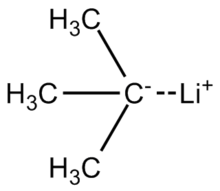This is an old revision of this page, as edited by Beetstra (talk | contribs) at 12:28, 10 January 2012 (Saving copy of the {{chembox}} taken from revid 468212255 of page Tert-Butyllithium for the Chem/Drugbox validation project (updated: '').). The present address (URL) is a permanent link to this revision, which may differ significantly from the current revision.
Revision as of 12:28, 10 January 2012 by Beetstra (talk | contribs) (Saving copy of the {{chembox}} taken from revid 468212255 of page Tert-Butyllithium for the Chem/Drugbox validation project (updated: '').)(diff) ← Previous revision | Latest revision (diff) | Newer revision → (diff)| This page contains a copy of the infobox ({{chembox}}) taken from revid 468212255 of page Tert-Butyllithium with values updated to verified values. |

| |
| Names | |
|---|---|
| Preferred IUPAC name tert-Butyllithium | |
| Identifiers | |
| CAS Number | |
| 3D model (JSmol) | |
| Beilstein Reference | 3587204 |
| ChemSpider | |
| EC Number |
|
| MeSH | n-butyllithium |
| PubChem CID | |
| UN number | 3394 |
InChI
| |
SMILES
| |
| Properties | |
| Chemical formula | LiC 4H 9 |
| Molar mass | 64.055 g mol |
| Appearance | Colorless solid |
| Density | 660 mg cm |
| Solubility in water | Reacts |
| Hazards | |
| GHS labelling: | |
| Pictograms |     
|
| Signal word | Danger |
| Hazard statements | H225, H250, H260, H304, H314, H336, H411 |
| Precautionary statements | P210, P222, P223, P231+P232, P370+P378, P422 |
| NFPA 704 (fire diamond) |
 |
| Flash point | -6.6 °C |
| Related compounds | |
| Except where otherwise noted, data are given for materials in their standard state (at 25 °C , 100 kPa).
| |